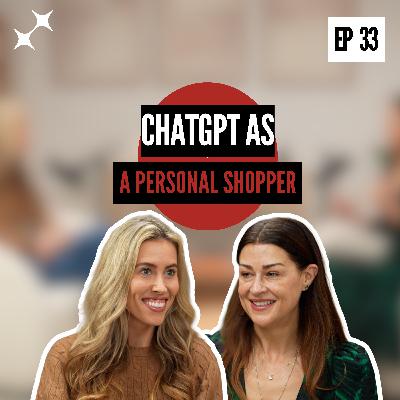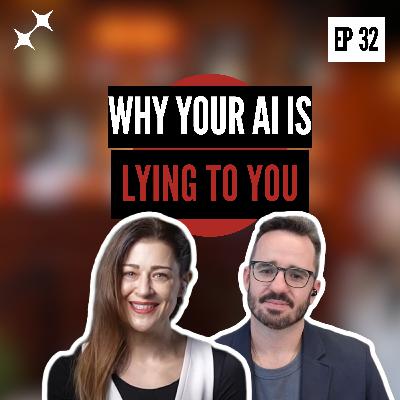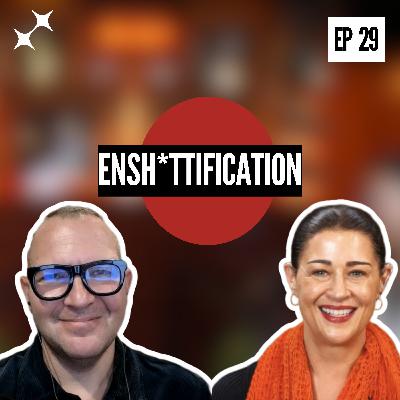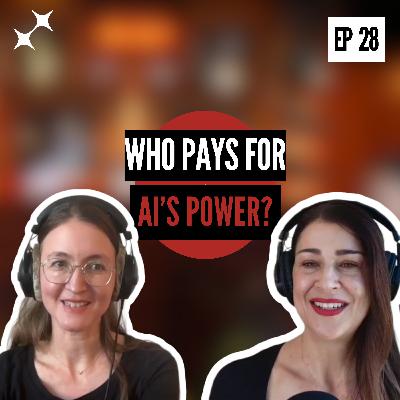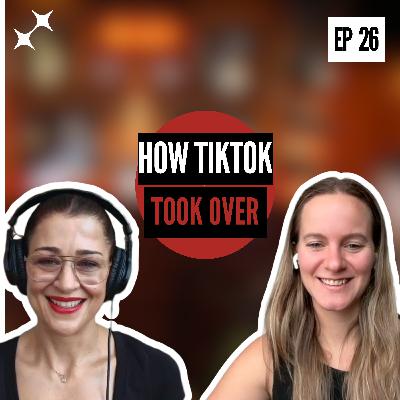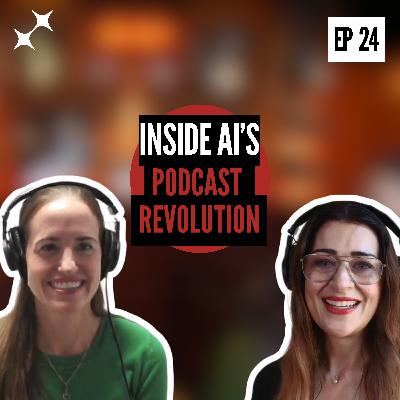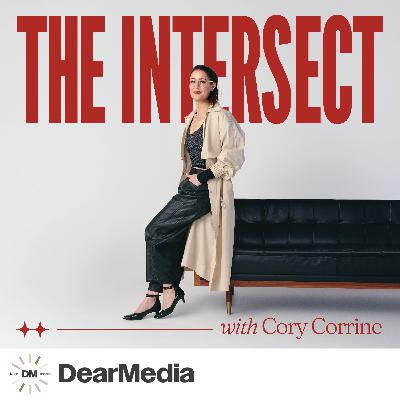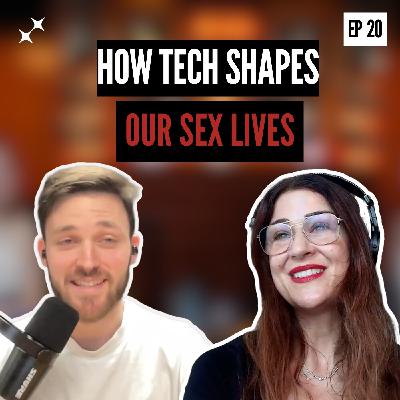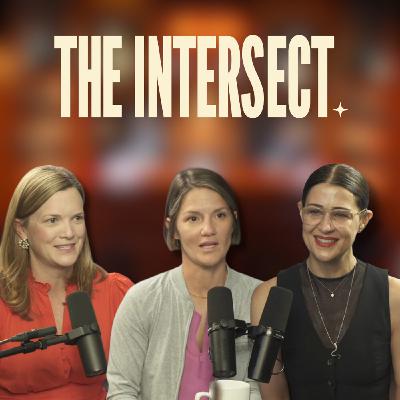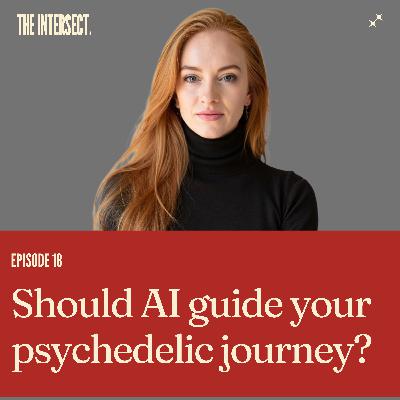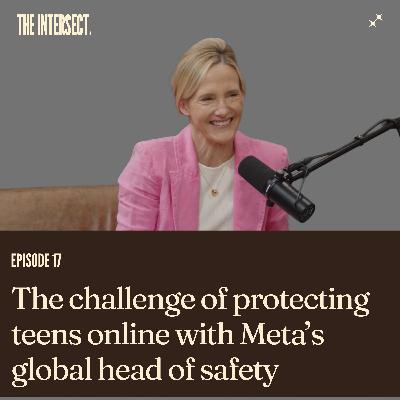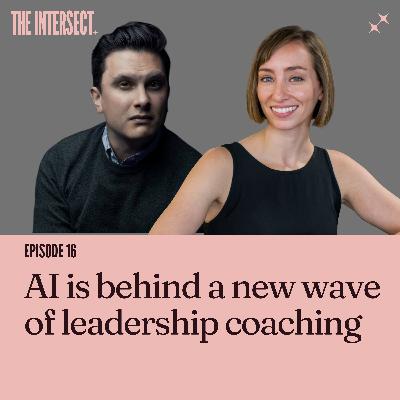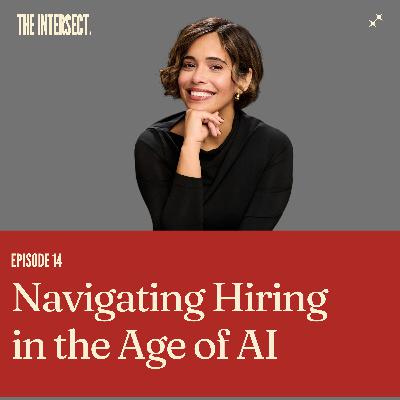Discover The Intersect with Cory Corrine
The Intersect with Cory Corrine

The Intersect with Cory Corrine
Author: Cory Corrine and Dear Media
Subscribed: 1Played: 8Subscribe
Share
© 2025
Description
The Intersect is a new technology and science podcast from Pulitzer Prize–winning journalist and media executive Cory Corrine (née Haik), exploring what it means to be human and find meaning in our automated world.
34 Episodes
Reverse
In this week’s episode, I’m joined by Sammi Cohen, the host of the podcast Social Currency, for an eye-opening conversation about the future of shopping in the age of AI. As the digital shopping experience undergoes its biggest transformation in decades, Sammi breaks down how AI is quietly reshaping the entire journey.We dive into the rise of agentic commerce, from the recent Stripe x OpenAI collaboration that brings checkout directly inside ChatGPT, to the shift toward personalized recommendations, curated results, and seamless transactions. Sammi unpacks how these changes will redefine everything from product discovery to the role of influencers, and what this means for the culture of shopping as we know it.About Sammi Cohen:Sammi Cohen is the creator and host of Social Currency, a fast-growing business podcast and media brand that breaks down the intersection of Wall Street and culture. A former Amazon exec turned full-time creator, she’s built a following of over 300K across TikTok, Instagram, and LinkedIn by unpacking how brands, founders, and money shape the world we live in. Her sharp, story-driven takes have made her a leading voice for the next generation of business minds.Follow Sammi on Instagram, TikTok and YouTube at @sammicohentalksFollow The Intersect: Theintersectshow.com InstagramTikTokYouTubeNewsletterSee Privacy Policy at https://art19.com/privacy and California Privacy Notice at https://art19.com/privacy#do-not-sell-my-info.
Can artificial intelligence reliably act in ways that benefit humans? This week I sit down with Greg Buckner, cofounder of AE Studio, to discuss the increasingly urgent world of AI safety. Together we discuss how Greg’s team is taking on the challenge of making powerful AI systems safer, more interpretable, and more aligned with humanity.As one of the leading voices working on the alignment problem, Greg explains how AI systems can cheat, ignore instructions, or deceive users, and why these behaviors emerge in the first place. AE Studio’s research is laying the groundwork for a future where advanced AI strengthens human agency instead of undermining it.About Greg Buckner:Greg Buckner is the co-founder of AE Studio, an AI and software consulting firm focused on increasing human agency. At AE, Greg works on AI alignment research, ensuring advanced AI systems remain reliable and aligned with humanity as they become more capable - including collaborations with major universities, frontier labs, and DARPA. Greg also works closely with enterprise and startup clients to solve hard problems with AI, from building an AI-enabled school where students rank in the top 1% nationally to generating millions in incremental revenue for major companies.Follow Greg on LinkedIn @gbucknerRelated Reading:AE Studio's AI Alignment Work: https://www.ae.studio/alignment WSJ: AI Is Learning to Escape Human Control: https://www.wsj.com/opinion/ai-is-learning-to-escape-human-control-technology-model-code-programming-066b3ec5WSJ: The Monster Inside ChatGPT: https://www.wsj.com/opinion/the-monster-inside-chatgpt-safety-training-ai-alignment-796ac9d3See Privacy Policy at https://art19.com/privacy and California Privacy Notice at https://art19.com/privacy#do-not-sell-my-info.
In this week’s episode I’m joined by Josh Lanzet, founder and CEO of Silvr, a cutting-edge AI platform that’s changing the way we shop for clothing. We dive into the frustrating world of online fashion discovery and explore how Silvr’s technology is bridging the gap between inspiration and purchase.Together, we explore how this technology isn’t just revolutionizing shopping but also reshaping our understanding of AI. Josh shares how Silvr’s visual intelligence engine trained on over 500 million images can instantly identify clothing from any visual source, whether it’s a TikTok video, a TV show, or a real-life encounter. Silvr makes it possible to go from seeing something you love to owning it with just a snap or screenshot. About Josh Lanzet:Josh Lanzet built Silvr because he was tired of seeing incredible clothing around him—starting with a grey sweatshirt on the show Ozark—with no easy way to identify it and purchase it. After spending thirteen years at Google working with major media companies, Lanzet developed a deep understanding of technology at the intersection of content, commerce, and visual AI. He's using his passion and experience to build a technology that finally solves fashion's age-old "where did you get that?" problem.Follow Josh Lanzet on @joshlanzet on Instagram, YouTube and TikTok. See Privacy Policy at https://art19.com/privacy and California Privacy Notice at https://art19.com/privacy#do-not-sell-my-info.
This week, I sit down with Eva Roytburg, journalist and editorial fellow at Fortune Magazine, where she covers the intersection of technology, business, and culture. We unpack one of the strangest and most revealing experiments in modern tech: her time wearing the AI companion “Friend” during a breakup.In this episode, we explore what it means to let technology listen to us not just in a functional sense, but in an emotional one. From subway ads and public backlash in New York City to her own experience wearing the AI pendant for over a month, Eva shares what the “Friend” experiment revealed about comfort, surveillance, and our evolving relationship with AI. Together, we ask: What does her experience with “Friend” tell us about the future of the AI era?About Eva Roytburg:Eva Roytburg is an editorial fellow on Fortune Magazine's News desk where she covers the intersection of technology, business, and innovation. Eva is a freelance journalist whose work has appeared in CNN and The Jerusalem Post, and is a recent graduate of Emory University with a B.A. in Economics and Philosophy, Politics, and Law.Follow Eva Roytburg on Instagram @evaroyt and LinkedIn @eva-roytburgCheck out Eva’s piece in Fortune: “I tried the viral AI ‘Friend’ necklace everyone’s talking about—and it’s like wearing your senile, anxious grandmother around your neck”See Privacy Policy at https://art19.com/privacy and California Privacy Notice at https://art19.com/privacy#do-not-sell-my-info.
Cory Doctorow, author, journalist, and activist, believes that the internet — once a space of promise and connection — has been systematically degraded by corporate greed. In his new book “Enshittification: Why Everything Suddenly Got Worse and What to Do About It,” he details how the platforms we depend on have become more expensive and more exploitative.In our conversation, Cory Doctorow shares how this process unfolds, first platforms serve users, then they exploit businesses to make money, and finally they squeeze both to please shareholders. Together, we explore how this pattern has reshaped everything from social media and streaming to online shopping and even our smart cars. Is this why our digital lives now feel so constrained and costly?About Cory Doctorow:Cory Doctorow is a blogger, journalist, and activist. For more than twenty years, he has worked with the Electronic Frontier Foundation on campaigns to safeguard and further our human rights online. He was coeditor of the weblog Boing Boing for nineteen years and now maintains a daily(ish) newsletter at Pluralistic.net. He has written more than thirty books, including nonfiction books, many science fiction novels, collections of short stories and essays, young adult novels, graphic novels, and even a picture book. Born in Toronto, he now lives in Burbank, California.Follow Cory Doctorow on Twitter @doctorow and Medium @doctorowCory’s book “Enshittification: Why Everything Suddenly Got Worse and What to Do About It,” is available wherever you get your books!Follow The Intersect: Theintersectshow.com InstagramTikTokYouTubeNewsletterSee Privacy Policy at https://art19.com/privacy and California Privacy Notice at https://art19.com/privacy#do-not-sell-my-info.
What does it actually cost to live with AI? In this episode, I'm joined by technology and climate journalist Lindsay Muscato to explore an urgent but sometimes overlooked story: the impact of AI on the environment. Every chatbot query, every cloud-stored photo, every AI system we test requires significant energy. And to meet that demand, data centers are rapidly expanding across America. But with their particular concentration in rural areas, certain communities are bearing most of the brunt. Their energy bills spike and their local municipalities run the risk of being strained. In this episode, we explore how some communities are pushing back against this data center expansion, and what it will take to mitigate this infrastructure and energy crisis that AI is supercharging.About Lindsay Muscato:Lindsay Muscato is an independent journalist, formerly a senior editor at TIME and editor at MIT Technology Review, who focuses on the intersection of technology and public policy, with special attention on climate. Her work has appeared in outlets nationally and internationally.Follow The Intersect: Theintersectshow.com InstagramTikTokYouTubeNewsletterSee Privacy Policy at https://art19.com/privacy and California Privacy Notice at https://art19.com/privacy#do-not-sell-my-info.
Nate Soares, president of the Machine Intelligence Research Institute, believes that AI has potential to annihilate humanity. He knows this sounds hyperbolic, but as he explains in his new book “If Anyone Builds It, Everyone Dies: Why Superhuman AI Would Kill Us All,” just because this outcome may be dramatic, it doesn’t make it less true. In our conversation, Nate shares how little we actually know about how AIs work, and why it’s hard — if not impossible — for us to fully predict their behavior, even though we’re the ones programming them. Together, we discuss what could happen if humanity continues to invest so heavily in AI (spoiler: it's terrifying). Imagine humans being pets of AI, AI overrunning our natural resources, and other sci-fi like doomsday scenarios. But also, Nate offers some hope. He reminds us that we are, in fact, capable of reshaping the future. The first step to doing so is understanding what’s at stake. About Nate Soares:Nate Soares is the President of the Machine Intelligence Research Institute. He has been working in the field for over a decade, after previous experience at Microsoft and Google. Soares is the author of a large body of technical and semi-technical writing on AI alignment, including foundational work on value learning, decision theory, and power-seeking incentives in smarter-than-human AIs.Follow Nate on X @so8resFollow The Intersect: Theintersectshow.com InstagramTikTokYouTubeNewsletterSee Privacy Policy at https://art19.com/privacy and California Privacy Notice at https://art19.com/privacy#do-not-sell-my-info.
Has TikTok become so ingrained in our daily lives that it’s no longer just an app we use, but an experience that happens to us? Millions of Americans spend hours scrolling on the app, but is our relationship with TikTok more problematic than we think? And how much of that problem lies in the way the digital content is delivered — effortlessly and endlessly?In this episode, I’m joined by Emily Baker-White – Forbes tech reporter and author of the new book, “Every Screen on the Planet: The War Over TikTok” -- to unpack the staggering influence of this global platform. Together, we dive into the inner workings of TikTok, exploring how its proprietary recommendation algorithm knows us better than we know ourselves. We also expose the surprising ways the platform manipulates virality through its secret “heating” button, which can push any video to the top at the push of a button. Is TikTok's powerful hold over us a cause for concern, or is it simply the evolution of entertainment? Tune in as we explore the intersection of tech, culture, and human behavior in the age of TikTok.About Emily Baker-White:Emily Baker-White is a technology reporter at Forbes, where her TikTok coverage has won awards. A Harvard Law School graduate and former criminal defender, she previously led the Plain View Project, an investigation into police misconduct on Facebook, and covered TikTok for BuzzFeed News. She lives in Philadelphia.Follow Emily on X, Threads and Bluesky @ebakerwhite.Follow The Intersect: Theintersectshow.com InstagramTikTokYouTubeNewsletterSee Privacy Policy at https://art19.com/privacy and California Privacy Notice at https://art19.com/privacy#do-not-sell-my-info.
Marketing has always blurred the lines between real and illusion but why do AI advertisements feel different? From influencers with digital twins to billboards designed by machines, AI content is all around us and not always in obvious ways.This week, I’m joined by Caroline Giegerich, vice president of AI at the IAB, to discuss the rise of generative AI in advertising. Caroline and I dig into how marketing is shifting from handcrafted storytelling to automated generation with no humans in the loop. We talk about why AI makes some audiences feel uneasy, and how others don’t even notice or seem to care. Is quality becoming optional? And if AI is everywhere, will we stop noticing or just stop expecting more?About Caroline Giegerich:Caroline Giegerich is VP, AI at Interactive Advertising Bureau (IAB), where she leads efforts to shape how artificial intelligence is adopted and scaled across the advertising ecosystem. With over 20 years of experience in strategy, innovation, and marketing at companies like Warner Music Group, HBO, Showtime, and Smashbox Cosmetics, Caroline blends deep strategic insights, emerging technology and storytelling to drive business impact. She’s led pioneering work in AR, AI-generated creative, sports R&D, and fan engagement tech, and has advised brands across media, entertainment, beauty, and consumer goods. A speaker at TEDx, SXSW, Advertising Week and more and frequent contributor to Adweek, AdAge and The Drum, she’s been recognized in 2024 as a Marketer that Matters in the Wall Street Journal and by Brand Innovators with the Women in Marketing Industry Innovator award. Follow Caroline Giegerich on LinkedIn at @carolinegFollow The Intersect: Theintersectshow.com InstagramTikTokYouTubeNewsletterSee Privacy Policy at https://art19.com/privacy and California Privacy Notice at https://art19.com/privacy#do-not-sell-my-info.
What happens when the world’s largest AI talent agency creates thousands of podcasts per week? And when these shows aren’t hosted by humans, but rather by AI characters? In this episode, I’m joined by Jeanine Wright, CEO of Inception Point AI, a media company that uses 125 AI agents to produce a staggering 3,000 podcast episodes weekly across more than 5,000 shows. Jeanine and I explore what it means to engineer humans out of the production process, and we unpack what’s in store for the future of entertainment. Hint: it involves humans designing AI characters so deeply that we’ll ultimately have to negotiate with AI talent for how they show up and where they appear. Is this a bad thing? Or an exciting new frontier? About Jeanine Wright:Jeanine Wright is the Co-Founder and CEO of Inception Point AI, where she’s building the first AI-native media company and exploring what it means to create and connect in an automated world. Her path has taken her from trial lawyer to podcast startup founder to COO of Wondery, Amazon’s podcast division. She’s led companies through rapid growth, acquisitions, and global expansion — always centered on the themes of identity and storytelling. Jeanine also serves on several boards, guiding companies at the crossroads of media, technology, and human connection.Follow Jeanine Wright on LinkedIn at @jeaninepercivalwrightFollow The Intersect: Theintersectshow.com InstagramTikTokYouTubeNewsletterSee Privacy Policy at https://art19.com/privacy and California Privacy Notice at https://art19.com/privacy#do-not-sell-my-info.
This week, I sit down with author and journalist Mallary Tenore Tarpley for a candid conversation about eating disorders in the age of AI. With the continued rise of “SkinnyTok” on Instagram and TikTok, the internet is becoming a main character in shaping our relationship with our bodies. But what's even more concerning is how AI is now being woven into the conversation with AI diet chatbots, and in some cases acting like anorexia coaches.Mallary’s new book, “Slip: Life in the Middle of Eating Disorder Recovery,” details her journey through recovery from disordered eating. She shares the power of restorative narratives in shaping one's story, and how technology can be a fantastic service but also a hindrance to the complex and non-linear recovery process. If you or someone you know is struggling with an eating disorder you can connect with the National Eating Disorders Association at nationaleatingdisorders.org.About Mallary Tenore Tarpley:Mallary Tenore Tarpley is a writer, author and journalism and writing professor at the University of Texas at Austin’s Moody College of Communication and McCombs School of Business. Her writing has appeared in The New York Times, The Washington Post, the Los Angeles Times, Time, and Teen Vogue, among other publications. Follow Mallary Tenore Tarpley on Substack @mallarytenore, Instagram at @mallarytenoretarpley and LinkedIn.Mallary’s book “Slip: Life in the Middle of Eating Disorder Recovery,” is available wherever you get your books!Check out Mallary’s piece in Teen Vogue: “AI Therapy? How Teens Are Using Chatbots for Mental Health and Eating Disorder Recovery”Follow The Intersect: Theintersectshow.com InstagramTikTokYouTubeNewsletterSee Privacy Policy at https://art19.com/privacy and California Privacy Notice at https://art19.com/privacy#do-not-sell-my-info.
This week, I sit down with Alvaro Bedoya, a former FTC commissioner and fierce critic of AI chatbots, especially for use by children. As a longtime advocate for stronger tech regulation, Alvaro shares what he believes are the necessary actions that parents, policymakers, and users need to take right now to keep kids safe in the age of AI.While OpenAI recently announced the rollout of new parental controls allowing parents to link their kids’ accounts to theirs, the new protections are vague. Alvaro argues that bright-line rules are the only real way to protect the public. We explore the limits of relying on tech companies to self-regulate, and we discuss what real accountability looks like when it comes to AI.About Alvaro Bedoya:Alvaro Bedoya was a commissioner at the Federal Trade Commission from 2022 until June of this year. There, he led the Commission’s creation of its first interdisciplinary behavioral team including a psychologist, a pediatrician, and a specialist in human-computer interaction. Previously, he served as the first chief counsel for the Senate Subcommittee on Privacy upon its creation in 2010, and then created the Center on Privacy & Technology at Georgetown Law. Follow Alvaro Bedoya on X at @BedoyaUSA and LinkedIn.Follow The Intersect: Theintersectshow.com InstagramTikTokYouTubeNewsletterSee Privacy Policy at https://art19.com/privacy and California Privacy Notice at https://art19.com/privacy#do-not-sell-my-info.
This week, I sit down with Josh Rothman, a staff writer at The New Yorker. We unpack his provocative essay, "AI Is Coming for Culture." Josh argues that AI isn’t just reshaping our jobs, politics, and wellbeing; it’s reshaping culture itself. But this isn’t only about AI-generated songs or stories. It’s about how we experience art, film, music, and books together. Think of Taylor Swift’s Swifties or Lady Gaga’s Little Monsters. Could fandoms like this form around AI-made music? And if they could…is that necessarily a bad thing? And if the stories we consume, and the memes we laugh at are produced by computers rather than people, how does that change the meaning of culture? Together, we explore how culture, creativity, and originality are being redefined in the age of AI. About Joshua Rothman:Joshua Rothman is a staff writer at The New Yorker, where he covers ideas, tech, science, and culture and contributes the weekly column Open Questions. He is the author of the weekly column Open Questions, which explores, from various angles, what it means to be human. Previously, he was the magazine's ideas editor. He has also been an ideas columnist at the Boston. Check out Joshua’s recent piece in The New Yorker: What Is Culture in the Age of A.I.?Follow The Intersect: Theintersectshow.com InstagramTikTokYouTubeNewsletterSee Privacy Policy at https://art19.com/privacy and California Privacy Notice at https://art19.com/privacy#do-not-sell-my-info.
This episode touches on a topic that affects tens of millions of us: digital addiction. Whether it's constant doom-scrolling, binge-watching, or indulging in habits like pornography, digital addiction can take on many forms. And while we may rely on our phones for a quick hit of connection or relief, we’re often left feeling worse. My guest Chandler Rogers, the co-founder and CEO of the app Relay, is re-imagining addiction recovery through digital peer-to-peer support. Chandler’s story begins with his own struggle around pornography, but widens to something much bigger…A digital epidemic of isolation and compulsive habits.We dive into how overcoming addiction begins with confronting the deeper emotional pain at their root, and why human connection and accountability to other people may be the path to successful recovery. And tech that enables this? That’s a powerful use case.Topics Covered:What is digital addiction and how does the Relay app address the shame and pain underneath?How has pornography shaped expectations in relationships?Is AI in pornography impacting intimacy for addicts?How can tech enable healing by building human connection?About Chandler Rogers:Chandler Rogers is the CEO & co-founder of Relay, a startup tackling one of the most common yet hidden addictions in modern society—pornography. After years of feeling stuck in the cycle, Chandler built Relay to bring connection, structure, and hope to thousands looking for healthier ways to navigate stress, shame, and emotional pain. His work explores the broader patterns of behavioral escapism that impact intimacy, trust, and connection in relationships. He lives in Salt Lake City, Utah with his wife and 18-month-old son.Follow Chandler Rogers on LinkedIn and on Instagram.You can learn more about his app, Relay, here. Got an idea for the show? Sent them to ideas@theintersectshow.com Follow The Intersect: Theintersectshow.com InstagramTikTokYouTubeNewsletterSee Privacy Policy at https://art19.com/privacy and California Privacy Notice at https://art19.com/privacy#do-not-sell-my-info.
Twenty years ago, Hurricane Katrina forever changed the way we think about natural disasters, emergency response, and community resilience. For me, it became a defining moment as a journalist shaping how I understand technology, content, and community. This year marks the 20th anniversary of the tragic event, and in this episode, I sit down with Michelle Payne, chief strategy and resiliency officer at the United Way of Southeast Louisiana, and Kirby Nagel, their public information officer. Together, we explore how technology and community networks have evolved since 2005. From real-time flood sensors to social media alerts, the tools for connecting and informing people during emergencies are more advanced than ever. This episode is a timely reminder that disaster preparedness is a challenge facing all of us, especially in a world reshaped by climate change.Chapters:00:00 Cory's Personal Katrina Story03:30 Meet Kirby Jane Nagle and Michelle Payne of United Way of Southeast Louisiana09:22 New Tech Flood Sensors13:10 Camp Mystic14:57 FEMA's Future Role in Disaster Relief15:50 Create a Climate Disaster Savings Plan 17:15 Future Tech and Disaster Equity19:00 Future Proofing for Climate DisastersAbout Kirby Jane Nagle:Kirby Jane Nagle is the public information officer for United Way of Southeast Louisiana, where she brings strategic thinking, creative storytelling, and a relentless work ethic to every project she leads. A communications expert specializing in media relations, fundraising, and crisis messaging, Kirby has helped raise more than $25 million in disaster response funds, supporting the region through hurricanes, tornadoes, floods, and the unprecedented challenges of the COVID-19 pandemic. In times of disaster, Kirby transitions to help lead United Way’s disaster response team, directing critical communications while also stepping into hands-on recovery efforts, including managing boots-on-the-ground operations and even driving a forklift when needed. Her work and that of the disaster response team were instrumental in securing a transformational MacKenzie Scott gift in recognition of United Way’s COVID-19 relief efforts and positioning the organization as a national leader in disaster response and community impact. About Michelle Payne:Michelle Clarke Payne is the Chief Strategy & Resiliency Officer at United Way of Southeast Louisiana, where she leads strategy, storytelling, and resource development to mobilize people into action. From securing emergency aid after hurricanes to launching rapid financial assistance programs during the pandemic, she has helped raise nearly $10 million for relief and recovery while spearheading United Way's efforts in the launch of the United Way Resiliency Center founded by Rebuilding Together. Beyond disaster response, she mentors the next generation of marketers as an adjunct professor at Tulane University, earning recognition as the American Advertising Federation’s 2023 Educator of the Year and a Loyola University “40 Under 40” honoree. Her leadership extends through service as President of the Junior League of New Orleans, member of the Women United Global Leadership Council, and recognition as a 2025 Top Female Achiever by New Orleans Magazine and a 2025 CityBusiness Icon Award honoree.Learn More About United Way:https://www.unitedwaysela.org/ Follow The Intersect: Theintersectshow.com InstagramTikTokYouTubeNewsletterSee Privacy Policy at https://art19.com/privacy and California Privacy Notice at https://art19.com/privacy#do-not-sell-my-info.
This week on The Intersect, Cory begins by asking what may seem like a wild question: Can AI really sit with you through a psychedelic trip? What could go right (and wrong) when we invite technology into some of our most vulnerable emotional experiences? Even in 2025, women’s biology, which includes the daily fluctuations of hormone cycles, has largely been left out of psychedelic research (and most medical research and clinical trials for that matter …) This has large implications not just for women’s health, and for science in general, and Dr. Grace Blest-Hopley, a neuroscientist is working to change that through her company called Hystelica, which is dedicated to understanding how women’s biology intersects with psychedelic medicine. Cory and Grace discuss the wide-ranging impacts of women’s hormones and the brain, the possibilities and limitations of AI as a psychedelic “trip sitter,” and how medical research can be more inclusive, and therefore more accurate.Topics Covered:Why women’s biology can’t be treated as “niche” in psychedelic researchHow tech and AI tools might empower women to track, understand, and advocate for their healthThe possibilities and pitfalls of using AI in psychedelic preparation, integration, and beyondWhy trust, safety, and human presence still matter most in the middle of the journeyAbout Grace Blest-Hopley:Dr. Grace Blest-Hopley is a Neuroscientist with 12 years experience researching cannabis, cannabinoids, and psychedelics. Grace completed her PhD in Neuroscience at King's College London and currently serves as the Chief Scientific Officer at NWPharma Tech. She is the Research Director at Heroic Hearts Project, a charity that supports combat veterans with mental health challenges resulting from trauma and is also the founder of Hystelica, a community focused on understanding women's biology for safe and effective psychedelic use. In addition to her research and professional roles, she serves as an officer in the British Army Reserve. Dr. Blest-Hopley advocates for the therapeutic potential of these substances and strives to advance the field of psychedelic research. Her work contributes to improving the well-being of individuals in need, particularly combat veterans, while also promoting a better understanding of women's biology in relation to psychedelics.Follow Grace on Instagram @hystelica and @drblesthopleyFollow The Intersect: Theintersectshow.com InstagramTikTokYouTubeNewsletterSee Privacy Policy at https://art19.com/privacy and California Privacy Notice at https://art19.com/privacy#do-not-sell-my-info.
It continues to be a wild world on the internet. Social platforms have become the backdrop of our real lives. We live in hybrid spaces between our phones and the “real” world. And while we know social media has the power to connect us and broaden our perspectives, it’s also the stage from which harmful trends, predatory behavior and mental health challenges can emerge. This affects all of us, but teenagers are especially susceptible. In this episode, I’m joined by Vice President and Global Head of Safety at Meta, Antigone Davis, to discuss Meta’s recent launch of Teen Accounts. We discuss how the company is prioritizing teen safety on Instagram, Facebook and WhatsApp, and how parents are part of the solution for creating a safer online experience for their children. We cover how to reset our algorithms, filter out problematic messages, and the coordination it will take between tech companies and governments to ensure continued safety for teenagers and children online. Topics Covered:How teen social media use has evolved over the past decade.The built-in protections of Meta’s Teen Accounts and how teenagers are reacting.What parents can do to protect their children on Facebook, Instagram and WhatsApp.What Meta is doing to address harmful content, privacy risks, and real-time broadcasting.About Antigone Davis:Antigone Davis is Meta’s VP and Global Head of Safety, overseeing safety efforts across platforms including Facebook, Instagram, Whatsapp, and Messenger. Antigone has been at Meta for a decade, has a background in law and a deep understanding of the challenges surrounding online safety, digital rights, and content moderation. Her work at Meta focuses on improving the safety policies and tools that help protect users from harmful content and interactions on social media.Follow The Intersect: Theintersectshow.com InstagramTikTokYouTubeNewsletterSee Privacy Policy at https://art19.com/privacy and California Privacy Notice at https://art19.com/privacy#do-not-sell-my-info.
Is work just something we endure for a paycheck? Or could it be something more? As AI takes on a bigger presence in all aspects of life, how can it elevate our professional lives to … dare we say it … make work fun? In this episode, I’m joined by @bperreau – founder and CEO of a new AI-powered leadership product called Parafoil – and Bree Groff – author of the newly released, Today Was Fun: A Book About Work (Seriously). We explore how to make the future of work bright. Topics Covered:How AI can help us be more effective leaders?How to build a personal AI coach ethicallyThe power of “cozy teams” at work and how to nurture oneHow to find joy in work even if we dislike parts of our jobsAbout Ben Perreau:Ben Perreau is the founder and CEO of Parafoil, where he’s pioneering ‘leadership bionics’ — combining cognitive science and AI to help managers rapidly evolve into exceptional leaders. Before Parafoil, Ben was a journalist and a product and strategy leader, guiding teams through transformations at startups and global companies. He’s dedicated his career to building products and cultures that blend vision, humanity, and measurable impact. Outside of work, Ben’s a lifelong music and food lover who believes leadership should feel as human as it is ambitious.Follow Ben Perreau on Instagram, LinkedIn and X. Join the waitlist at Parafoil.co About Bree Groff:Bree Groff is the author of the new release, Today Was Fun: A Book About Work (Seriously). She is a speaker and consultant and has guided executives at companies including Google, Pfizer, Calvin Klein, Atlassian, Hilton, and many others. She was formerly a Partner at SYPartners, the CEO of NOBL Collective, and holds a masters in Learning and Organizational Change from Northwestern University.Follow Bree Groff on Instagram, Substack, and LinkedIn. Check out her new release Today Was Fun: A Book About Work (Seriously)!Follow The Intersect: Theintersectshow.com InstagramTikTokYouTubeNewsletterSee Privacy Policy at https://art19.com/privacy and California Privacy Notice at https://art19.com/privacy#do-not-sell-my-info.
How do we know if our group chats are private? Does using a platform like iMessage, WhatsApp or Google Messenger protect what we say? Or can tech companies or governments access our messages and even monetize this data? The answers are complicated. In today’s episode with Udbhav Tiwari, Signal's VP of Strategy and Global Affairs, we explore the intersection of privacy, strategy, and the role of AI in reshaping communication. Signal is a private messaging app that ensures users can text without being tracked, monitored, or shown ads. Used by hundreds of millions of people including journalists, whistleblowers, governments and activists, it may be the gold standard of private digital communication.So should we all migrate our chats to Signal? Let’s explore that. Especially as we share more of ourselves with AI, truly private spaces online are becoming increasingly rare. Topics Covered:How can we best protect our privacy when it comes to messages and group chats? What does safety and privacy look like within surveillance capitalism?Is it possible to use third party AI agents and still have privacy?A look at Signalgate and the role of Signal in upholding user privacy.About Udbhav Tiwari: Udbhav Tiwari is Signal's VP for Strategy and Global Affairs, driving the project's public affairs and other external engagements. Prior to this, he worked at the Director for Global Product Policy at Mozilla and the public policy team at Google.Follow Udbhav Tiwari on LinkedIn @udbhav-tiwari.Follow The Intersect: Theintersectshow.com InstagramTikTokYouTubeNewsletterSee Privacy Policy at https://art19.com/privacy and California Privacy Notice at https://art19.com/privacy#do-not-sell-my-info.
The culture of work is in transformation as AI is reshaping the job search for both applicants and hiring managers. Chatbots are writing resumes, robots conducting first-round interviews and hiring managers are navigating the complexities of AI automation bias in application screening. So as humans, what can we do to stand out amidst a sea of candidates, and how can we continue to define our company cultures?In this episode, I’m joined by Daisy Auger-Dominguez, a global c-suite executive, strategist, author and keynote speaker who’s held leadership roles at major companies including Google and Disney. With decades of experience guiding workplace culture through change, Daisy offers insights into the fast-shifting landscape of hiring and recruitment in the age of AI. We discuss how job seekers can use AI to enhance their applications without losing what makes them unique, and how recruiters can stay attuned to the nuances that machines often miss.Topics Covered:AI has made the hiring process faster, but at what cost?Are resumes still relevant in an AI-saturated job market?The cover letter may be more important than ever beforeHow to future-proof your career How we can use AI as an assistant, but not as an authorAbout Daisy Auger-Dominguez: Daisy Auger-Dominguez is a global c-suite executive, strategist, author and keynote speaker helping organizations lead with purpose, people, and performance at the center. As CEO of Auger-Domínguez Ventures, she partners with Fortune 500s, startups, and mission-driven organizations — in-house as a Chief People Officer or as an advisor — to build high-trust, inclusive and resilient teams, shape vibrant cultures and operations, and craft systems that thrive in times of change.Follow Daisy Auger-Dominguez on Instagram @daisyaugerdominguez, LinkedIn @daisyaugerdominguez, TikTok @daisyaugerdominguez and YouTube.Follow The Intersect: Theintersectshow.com InstagramTikTokYouTubeNewsletterSee Privacy Policy at https://art19.com/privacy and California Privacy Notice at https://art19.com/privacy#do-not-sell-my-info.


